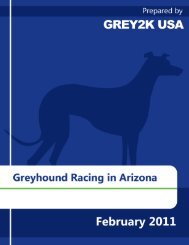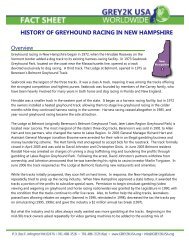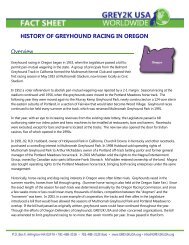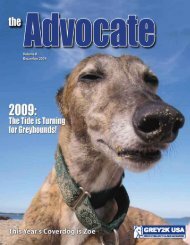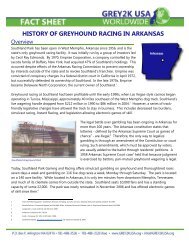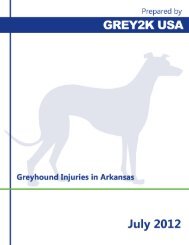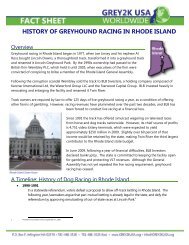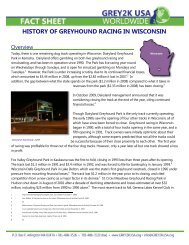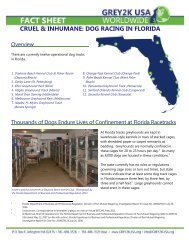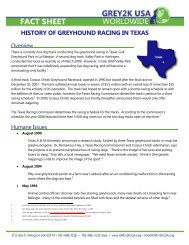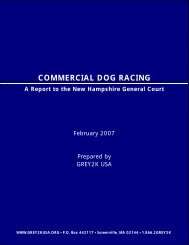HISTORY OF GREYHOUND RACING IN KANSAS - Grey2K USA
HISTORY OF GREYHOUND RACING IN KANSAS - Grey2K USA
HISTORY OF GREYHOUND RACING IN KANSAS - Grey2K USA
Create successful ePaper yourself
Turn your PDF publications into a flip-book with our unique Google optimized e-Paper software.
<strong>HISTORY</strong> <strong>OF</strong> <strong>GREYHOUND</strong> <strong>RAC<strong>IN</strong>G</strong> <strong>IN</strong> <strong>KANSAS</strong>OverviewGreyhound history in Kansas goes back to the mid-nineteenth century, when farmersimported greyhounds to help control the jackrabbit population. Later in the centurycoursing – in which greyhounds chased live rabbits in an enclosed field – became apopular entertainment. The first regulated greyhound coursing match in the UnitedStates was held at Cheyenne Bottoms, Kansas in 1886.One hundred years later, in 1986, Kansas voters decided by referendum to amend the state constitution to allowpari-mutuel wagering at racetracks. The Legislature passed the Kansas Parimutuel Racing Act the following year.In 1989 two greyhound tracks opened within a week of one another: Wichita Greyhound Park, near Wichita; and TheWoodlands near Kansas City, which later added a horse track. Camptown Greyhound Park, in Frontenac, opened in1995 and closed six months later. Camptown reopened under new ownership in 2000 but again suffered heavylosses and closed before the end of the season.The racing industry boasts that Kansas is the home of greyhound racing. The National Greyhound Association (NGA),which operates the national registry of racing greyhounds, is located in Abilene; so is the National Greyhound Hall ofFame. There are more than fifty greyhound breeding farms in the state, and among them they produced 6,500 ofthe 35,800 greyhounds whelped in 1998. Yet pari-mutuel greyhound racing is a dying industry here, as it iseverywhere in the country.Since The Woodlands opened in 1989 attendance has steadily declined, from a peak of over 1,700,000 in 1990 tofewer than 400,000 in 2000. The track filed for bankruptcy in 1996 but is still in operation.Wichita Greyhound Park saw a similar slide, from justunder 800,000 in 1990 to half that in 1996, the last yearfor which figures are available. In 1997 the Wichita trackwas purchased by Phil Ruffin, Sr., of Wichita, owner ofthe Frontier Casino in Las Vegas and the Crystal PalaceResort and Casino in the Bahamas. Ruffin also owns theill-fated Camptown track.Throughout the past decade, while profits andpatronage for greyhound racing have plummeted, theWichita Greyhound Parkracing industry and its political allies have repeatedlybegged the Legislature to authorize slot machines at the tracks. Slot machines would bring vastly expandedgambling opportunities, which in turn would mean increased profits for the racetracks. The industry holds out the
plum of increased tax revenues as an enticement to lawmakers. But in the few states where slot machines have beenintroduced, they have brought with them a host of social problems and a strong risk of political corruption. Ofspecial concern is the fact that profits from slots are used to augment purses. In effect, slot machines at the trackssubsidize and perpetuate the suffering of racing greyhounds.Capsule History, 1989-2003 1989Pari-mutuel racing begins in Kansas. Wichita Greyhound Park and The Woodlands open. 1993A proposal to put a constitutional amendment allowing privately owned casinos on a statewide ballot isapproved in the Senate but fails in the House. 1 February 1995Jorge Anthony (Tony) Hughes is arrested with four others after selling 2.2 pounds of cocaine to anundercover FBI agent. Two of Hughes's companions are armed and a third is transporting arms in his car.In an FBI affidavit, an informant states that on three previous occasions Hughes had sold him illegalsteroids (testosterone). Hughes is vice president of Hughes Kennels, a greyhound kennel at TheWoodlands. 2 1995The Legislature authorizes four Kansas Indian tribes to open casinos on their lands in Northeast Kansas. May 1995After five years of wrangling and lawsuits and two years of construction, Camptown Greyhound Parkopens in May. The latest obstacle was strong public opposition over the use of $2.3 million in taxpayers'money to fund sewer, water and street improvements during construction. 3 Summer 1995The financially struggling Woodlands shortens its horse-racing season and eliminates Tuesday nightgreyhound racing. The track is losing about $300,000 a month. In August five banks grant the track asix-month extension on a $27.6 million mortgage payment due in January 1996; the amount due exceedsthe entire previous year's operating revenue by $8.l million. 4 November 1995Camptown Greyhound Park closes six months after opening and six weeks before the end of the racingseason, having lost $250,000 a month during its brief operation. Hundreds of greyhounds are left behind,their fate uncertain since suddenly they are a financial liability. 5 November 1995The Racing Commission allows The Woodlands to suspend almost $300,000 in charitable contributions,required by law. In return the TRAK East, the nonprofit organization through which the track is licensedby the state, will share in slot machine profits if slots legislation passes in 1996. Governor Bill Graves,1 Kansas City Star/John Petterson, March 20, 19932 Greyhound Network News, Spring 1995; Kansas City Star/John T. Dauner, February 22, 19953 Greyhound Network News, Spring 1994, Summer 19954 Greyhound Network News, Fall 1995; Kansas City Star/Rick Alm, August 7, 19, 31, 1995; /Bill Graham, August 13; Associated Press, July 8, 19955 Kansas City Star/John Petterson, November 4, 19952
previously opposed to expanded gambling, now says that the pari-mutuel industry is unlikely to survivewithout it. 6 1996An audit of the Kansas Racing Commission finds significant failures to function according to state law andthe commission's own regulations. Among the criticisms: Failure to test all winning greyhounds – or insome instances any greyhounds at all – for controlled substances; failure to impose meaningful penaltieswhen such substances were found; failure to complete investigations in a timely manner; and allowingunlicensed individuals to judge races. A newly appointed executive director promises better performancein the future. 7 Spring 1996A proposal that would have placed a constitutional amendment to allow gambling expansion on astatewide ballot fails in the Senate. Other expanded gambling bills, aimed mostly at bailing out thefailing Woodlands track, are defeated. Shortly after the Legislature adjourns The Woodlands files forbankruptcy protection. Liabilities include $28.7 million in bank loans and $1.7 million in unpaid taxes. 8 August 1996In an attempt to bail out The Woodlands, the Kansas City city council includes on the city's primary ballota measure to amend the city's home rule charter to allow slot machines at The Woodlands. The measureis overwhelmingly approved. The state Attorney General says the vote was unconstitutional: "If slotmachines are brought into the county, I will file criminal charges." 9 1996-97At The Woodlands, betting in 1996 was down 17 percent over the year, and attendance was down 31.9percent. Attendance at Wichita Greyhound Park in 1996 was down 22 percent, while the handle (totalamount wagered) dropped by $12.6 million. Nevertheless, in 1997 the operators and lobbyist of WichitaGreyhound Park donate almost $38,000 to political campaigns; the lobbyist himself is paid $50,000 ayear. 10 1997In January Assistant State Attorney Christopher Holly files a petition with the Kansas Racing and GamingCommission requesting hearings into illegal betting at The Woodlands. Specifically, the petition allegesthat seven current or former Woodlands employees accepted illegal bets from a high-stakes Floridagambler, placed through local third parties, eleven times between February 1993 and October 1996. Thepetition seeks $55,000 in civil fines.In February a Wyandotte County district judge issues a restraining order blocking the hearings.In April the Commission drops all charges in exchange for a $15,000 settlement. The track's attorney saystheir denials have been vindicated. Holly says, "Our position is that something did happen." (Note:6 Greyhound Network News, Winter 1995-96; Kansas City Star/John Petterson, November 18, 19957 Greyhound Network News, Spring 1996; Kansas City Star/John Petterson, January 30, 19968 Greyhound Network News, Summer 1996, Kansas State Collegian/Associated Press, April 17 1996; Kansas City Star/Rick Alm, May 18, 19969 Greyhound Network News, Fall 1996; Kansas City Star/Ann Lamoy, August 8, 199610 Greyhound Network News, Spring 1997; Kansas City Star, January 4, 1997; Associated Press/John Hanna, April 7 and 14, 19973
Christopher Holly is the assistant state attorney who filed the petition, but he also serves as an attorneyfor the Racing and Gaming Commission.) 11 Spring 1997In a now-familiar scenario, two expanded gambling bills fail in the Legislature. The lobbyist for WichitaGreyhound Park quits, burned out after five years. 12 November 1997 1998Phil Ruffin, Sr., who operates a dozen Marriott hotels and owns casinos in Las Vegas and the Bahamas,buys Wichita Greyhound Park for about $10 million. 13Two years after The Woodlands first filed for bankruptcy, and following the failure of two reorganizationplans, the track goes into liquidation. In December ownership passes to gaming and constructionmagnate William M. Grace, who holds 85 percent of the track's mortgage debt. 14 July 1999A 19-year old maintenance worker at Wichita Greyhound Park is electrocuted before the eyes of 1,200racing fans while trying to repair the trip wire that opens the gates. 15 February-April 1999Another slot machine bill is introduced in the Senate at the behest of The Woodlands. It is defeated27-13. According to Senator Lana Oleen, gambling bills have been brought before the Legislature sixteentimes in the past nine years. 16 Octber 13, 1999Phil Ruffin, Sr., who bought Wichita Greyhound Park in 1997, buys Camptown Greyhound Park from itspresent owners. He says administration of the two tracks will be merged. 17 April 2000The latest slot machine bill dies in the Senate. 18 Fall 2000Camptown Greyhound Park, which had reopened after being closed for five years, operates for 74 daysbefore closing again. The track lost $30,000 a week. New owner Phil Ruffin, Sr. bought Camptown in1999 expecting that a slot machine bill would be passed. Without slots the track purchase was "a trialballoon," says the executive manager. Rescue groups organize a massive effort to save strandedgreyhounds. 1911 Greyhound Network News, Spring and Summer 1997; Kansas City Star/Rick Alm, February 20 and April 26, 199712 Greyhound Network News, Summer 1997; Topeka Capital-Journal/Associated Press/John Hanna, April 14, 199713 Wichita Eagle/Associated Press, November 8, 1997; /Joe Rodriguez, November 26, 199714 Greyhound Network News, Summer 1998; Kansas City Star/John T. Dauner, November 12 and December 17, 199815 Greyhound Network News, Fall 1999; Wichita Eagle/Quannah Leonard, July 10, 199916 Topeka Capital-Journal/Carl Manning/Associated Press, April 3, 199917 Associated Press, October 13, 199918 Greyhound Network News, Summer 2000; Kansas City Star/Rick Alm, May 2, 200019 Greyhound Network News, Winter 2000-01; Wichita Eagle/Associated Press, November 16, 20004
March 2001Slot machine bills go down in the Senate in March, in the House in April. 20 January 2002Governor Bill Graves says in his State of the State message that he is "willing to consider slot machines" tohelp fill a budget shortfall. 21 February 2002The Kansas Racing and Gaming Commission is informed that funds possibly in excess of $200,000 havebeen stolen from The Woodlands racetrack, apparently by employees cashing company checks forpersonal use. The commission's interim executive director cites "a lack of control, a lack of accounting bymanagement." Six employees, including general manager August J. Masciota, two of his daughters, ason-in-law and the son-in-law's brother, have been fired. 22 Spring 2002On the heels of revelations of wrongdoing at The Woodlands, the latest bill to authorize slots isintroduced in the House. Track owners repeat their perennial complaint that they need slot machines atthe tracks in order to compete with casinos in neighboring Missouri. Testifying before the House TourismCommittee, Kevin Neuman of Kansas City REGAP (Retired Greyhounds as Pets) points out thatattendance at The Woodlands has declined every year since the track openedin 1989, five years before the first casino opened in Missouri. He also reminds them that The Woodlandsand one of the Missouri casinos share the same ownership.The bill is narrowly approved after two votes on the House floor but dies in the Senate JudiciaryCommittee when the Legislature adjourns. 23 May 2002While the slots bill is still in committee, a federal grand jury indicts Richard J. Boushka, one of the originalowners of The Woodlands, on 61 counts of felony fraud, involving the use of falsified documents toobtain $19 million in loans from a Wichita bank.Boushka owned 40 percent of The Woodlands from 1989 to 1994. Having originally invested $800,000 inthe track, he had received over $12 million in salary, stock returns and consulting fees by 1995. 24 December 2, 2002Boushka reaches a plea agreement with federal investigators, pleading guilty to several counts of felonyfraud in return for cooperation in further investigation. 25 December 2002In an interview, newly elected Governor Kathleen Sebelius declares her support for slot machines at thetracks. 2620 Greyhound Network News Spring 2001, Summer 2001; Kansas City Star/John Petterson and Jim Sullinger, March 23 and April 27, 200121 Topeka Capital-Journal/Chris Grenz, May 20, 200222 Greyhound Network News, Spring 2002; Kansas City Star/Rick Alm, February 16, 200223 Greyhound Network News, Spring and Summer 2002; Topeka Capital-Journal/Chris Grenz, May 20, 200224 Greyhound Network News, Summer 2002; Kansas City Star/Rick Alm, September 27, 1995; /James Fitzpatrick May 10, 2002; Wichita Eagle/Deb Gruver, December 3, 200225 Wichita Eagle/Deb Gruver, December 3, 200226 Greyhound Network News, Winter 2002-03, Summer 2003; Topeka Capital-Journal/Associated Press/John Hanna, December 30, 20025
March 2003Eugene Brundige pleads guilty to stealing about $74,000 from The Woodlands while he was employedthere in 2001. Brundige is the son-in-law of former Woodlands manager August J. Masciotra, who haspled not guilty to three counts of felony theft. (See February 2002, above) 27 May 2003After extended debate, two gambling bills are killed in the Senate at the very end of the session. Onewould have allowed casino gambling in counties where voters and officials approved it. The other wouldhave allowed racetracks to operate state-owned slot machines. The slot-machine bill was defeated 34-4,the casino bill by three votes. A House-approved expanded gambling bill did not reach the Senatefloor. 28 August 2003Repeated attempts by gambling interests to expand gambling have failed, in part because of conflictswithin the gambling industry. Horse and dog breeders, track owners, Indian tribes and others have allfought among themselves over who gets the biggest share of the pie. "There's tremendous greed," saysGlenn Thompson of the anti-gambling group Stand Up for Kansas. "Greed is what's driving the diversitywe see." Governor Kathleen Sebelius, who supports expanded gambling, establishes a 15-membercommittee in August to mediate among the conflicting interests and assess public opinion. 29Phil Ruffin says he would like to sell Wichita Greyhound Park and build a new greyhound track and casinodowntown. According to Ruffin, one percent of the revenue would go to the city, one percent to thecounty, and 25 percent or more to the state. Anti-gambling activist Glenn Thompson points out that thecomplex would generate about $50 million a year in personal income for Ruffin. 30 November 2003Speaking only for himself, Tom Wright, chairman of the governor's committee on expanded gambling,says he opposes using slot machines at the tracks to prop up the dying racing industry. "That doesn'tmake a lot of sense to me," he says. "I don't know that that industry, as opposed to any other industry,needs to have the state's support to that extent." 31 December 2003District Judge Terry Bullock rules that the state's method of funding public education is unconstitutional.He orders the legislature to fix the problem by July 1, 2004. The need for additional revenue stimulatesdiscussion over expanded gambling at the tracks. 32 December 2003The governor's committee on expanded gambling issues its report. Members approve racetrack slotmachines and casinos as possible sources of revenue, but say that large-scale gambling operationsshould be limited to Wyandotte County. They propose that racetrack slot machines be state-owned andthat the number be limited to 300-600.27 Greyhound Network News, Spring 2003; Kansas City Star/Rick Alm, March 19, 200328 Kansas City Star/John L. Petterson and Jim Sullinger, May 6, 200329 Associated Press/John Milburn, August 10, 2003; Lawrence Journal-World/Associated Press/John Hanna, November 24, 200330 Wichita Eagle/Dan Voorhis, August 10, 200331 Lawrence Journal-World, November 8, 200332 Wichita Eagle/Steve Painter, December 4, 20036
Phil Ruffin, Sr., owner of Wichita Greyhound Park, says he is "absolutely, adamantly opposed" to stateownership of slot machines. If slots were finally approved by the Legislature, Ruffin planned to install2,000 machines and move the track to downtown Wichita. He also planned to build a large-scaledowntown casino complex.Governor Sebelius plans to propose legislation to expand gambling but says she does not want tolimit slot machines to pari-mutuel facilities. The Legislature rejected proposals for expandedgambling earlier this year. 33Humane IssuesAre Racing Greyhounds Dogs?Not according to the state of Kansas. Racing greyhounds are specifically excluded from K.S.A. 47-1701, the state's"Pet Animal Act." Therefore, greyhounds are not given the same protection from abuse accorded to other dogs, cats,and companion animals in the state. Sadly, there is no federal law operating to correct this situation, and changemust come from within the state.Interviewed for an article in PitchWeekly, a former Kansas trainer and kennel owner said, "Over the 15 years I was inthe business, I probably killed about 1,500 dogs. I usually shot them in the head ....You either retrain or kill the slowerdogs. The owners don't want them back." They also don't want to pay the $20 vets charge to euthanize agreyhound; it's cheaper to shoot them. The trainer, who left the business in 1994, says he has a bone pile in his backyard. 34Bad Days for Greyhounds November 1995The new Camptown track in Frontenac closes after only six months of operation, leaving an estimated500 to 700 greyhounds stranded. Members of the Racing and Gaming Commission demand assurancesthat no dogs will be euthanized, and the track's general manager works to find alternate track bookings.Ultimately 78 dogs are put up for adoption, 33 of whom are still at the track on December 22. Also stillthere are 23 other greyhounds. Full details on the fate of all the dogs are unavailable. 35 September 1996Following an alert by the Greyhound Protection League (GPL), a search is instituted for 60 racinggreyhounds discarded by a Florida racetrack and sent on a "kill run" to Texas. Sixteen are found,abandoned and barely alive, on a rural roadside in Texas. Several more have died or are rumored to bedead. An additional 32 of the Florida dogs and 19 other greyhounds, all of them ill, are discovered on theproperty of a Corsicana man who has recently died.33 Topeka Capital-Journal/John Milburn, December 13, 2003; Wichita Eagle/Steve Painter, December 19, 200334 Kansas City Pitch Weekly/Vicki Watson Walker, June 24-30, 199935 Greyhound Network News, Winter 1995-967
Through a complicated series of negotiations, the industry-affiliated National Greyhound Association(NGA) arranges to transport 32 of the Florida greyhounds, along with two others, to their headquarters inAbilene. After the dogs' arrival, the GPL determines that at least ten in the shipment were not from theoriginal Florida group. The fate of those missing dogs is in question, as is the identity of the added dogsand the apparently devious route the hauler followed from Corsicana. (See the GNN article referencedbelow for details.)Bill and Cher Oliver of Kansas City REGAP travel to Abilene and are given 13 male greyhounds to placefor adoption. The NGA does not allow them to see the other dogs. 36 April 1998Employees preparing to mow the grass behind a utility substation in O'Fallon, Missouri discover 45decomposing bodies of greyhounds. Almost all are puppies, but among them are nine adult dogs, theirears cut off to avoid identification. Although the bodies are in different stages of decomposition, all havebeen dumped since the last mowing two weeks earlier. With them are the bodies of three rabbits and acat, small animals sometimes (illegally) used in training.There are no greyhound tracks in Missouri and no breeders in the area. Nearby Highway 79 is part of theusual route between Kansas and Iowa, and representatives of the St. Louis chapter of REGAP believe thatthe bodies were dumped by an out-of-state breeder, possibly from Kansas. On May 2 150 members ofKansas City REGAP demonstrate in Kansas City in memory of the O'Fallon greyhounds and launch apetition drive to end pari-mutuel racing in Kansas. 37 Fall 1998Kansas City REGAP participates in another massive rescue when the Greyhound Protection League andrescue groups across the country launch an emergency action to save over 200 greyhounds. The dogs,many debilitated and four injured, were stranded when the notorious Greenetrack in Eutaw, Alabamaclosed prematurely on September 6. After several weeks of on-site rehabilitation, the dogs are truckedin groups over a period of several weeks to adoption organizations throughout the South and Midwest.In December the final haul delivers seven greyhounds, including the one most severely injured, to KCREGAP. In all, 212 greyhounds are saved. Another 150 Greenetrack dogs could not be rescued andwere shipped to low-grade tracks in Florida, where they are at serious risk of being killed. 38 Fall 2000Over 700 greyhounds are stranded when Camptown Greyhound Park, which had reopened after beingclosed for five years, again shuts down prematurely in November. Most of the dogs are qualified only forlow-grade races, which bodes ill for their chances of survival.Louisiana-based adoption coordinator Cynthia Cash, who was also involved in the rescues describedabove, works with the Kansas Gaming and Racing Commission to place as many dogs as possible withadoption groups. By late December ten greyhounds have been adopted in Kansas36 Greyhound Network News, Fall 199637 Greyhound Network News, Summer 199838 Greyhound Network News, Winter 1998-998
and 113 have been sent to adoption groups in several states. Another 73 remain at Camptown awaitingtransport. Cash says full documentation was provided for each dog – a rarity in rescue operations – andthat the dogs were generally in good condition. 39 Summer 2001Greyhound Network News obtains injury reports for the 2000 racing season from the Kansas Gaming andRacing Commission under a public records request. The language of the reports is imprecise and doesnot always describe the actual nature of the injury. The following is a summary:At the Woodlands 173 greyhounds were injured. Of those, at least 47 suffered fractures, including 34fractures of the hock alone. Other injuries (unspecified) involved fore and hind feet, long bones, and thecarpal (wrist) joint of the foreleg. There were 53 muscle injuries. One dog was shocked by the live rail,another collided with the lure, and two collapsed with spinal injuries. Nine dogs were put to death.Wichita Greyhound Park reported 81 injuries, including 25 described as fractures. Curiously, no hockfractures are reported, but there were 23 injuries (unspecified) to the hock joint. Four dogs were put todeath.Camptown Greyhound Park reported 21 greyhounds injured during its shortened racing season (Aug.4 -Nov. 14). Fifteen dogs suffered fractures of the legs and feet, and of those 15, 11 were put to death. 2002-2003A distemper outbreak at the Flying Eagles Kennel, a breeding farm in Abilene, kills about 100 greyhounds.The kennel owner, Vince Berland, claims the disease is contained on his farm. However, distemper breaksout in Massachusetts in December, with an undisclosed number of greyhounds euthanized. In the samemonth at least two cases are confirmed at Wichita Greyhound Park and the park is quarantined. InArizona the following month 18 greyhounds are infected and euthanized. The disease also reachesFlorida, killing greyhounds at Sarasota and Hialeah. 4039 Greyhound Network News, Winter 2000-0140 Greyhound Network News, Winter 2002-03, Summer 2003Last Updated on January 13, 20049



